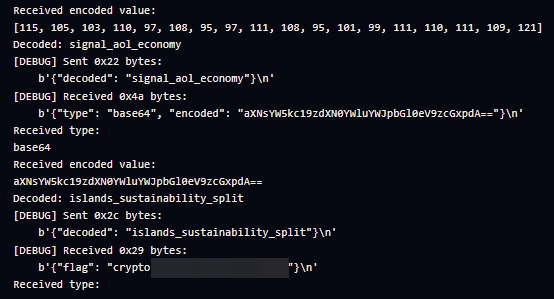CryptoHack: Encoding Challenge

Table of Contents
Introduction
Today i'll be solving the Encoding - Encoding Challenge on CryptoHack.
Now you've got the hang of the various encodings you'll be encountering, let's have a look at automating it.
Can you pass all 100 levels to get the flag?
The 13377.py file attached below is the source code for what's running on the server. The pwntools_example.py file provides the start of a solution.
For more information about connecting to interactive challenges, see the FAQ. Feel free to skip ahead to the cryptography if you aren't in the mood for a coding challenge!
If you want to run and test the challenge locally, then check the FAQ to download the utils.listener module. Connect at
socket.cryptohack.org 13377
Details
This question involves continuously solving 100 encoding challenges, the challenge also provides two files used to assist us:
13377.py
As mentioned in the question, this is the source code for the challenge which runs on the server. There are 5 encoding algorithms as highlighted below:
from Crypto.Util.number import bytes_to_long, long_to_bytes
from utils import listener # this is cryptohack's server-side module and not part of python
import base64
import codecs
import random
FLAG = "crypto{????????????????????}"
ENCODINGS = [
"base64",
"hex",
"rot13",
"bigint",
"utf-8",
]
with open('/usr/share/dict/words') as f:
WORDS = [line.strip().replace("'", "") for line in f.readlines()]
class Challenge():
def __init__(self):
self.no_prompt = True # Immediately send data from the server without waiting for user input
self.challenge_words = ""
self.stage = 0
def create_level(self):
self.stage += 1
self.challenge_words = "_".join(random.choices(WORDS, k=3))
encoding = random.choice(ENCODINGS)
if encoding == "base64":
encoded = base64.b64encode(self.challenge_words.encode()).decode() # wow so encode
elif encoding == "hex":
encoded = self.challenge_words.encode().hex()
elif encoding == "rot13":
encoded = codecs.encode(self.challenge_words, 'rot_13')
elif encoding == "bigint":
encoded = hex(bytes_to_long(self.challenge_words.encode()))
elif encoding == "utf-8":
encoded = [ord(b) for b in self.challenge_words]
return {"type": encoding, "encoded": encoded}
#
# This challenge function is called on your input, which must be JSON
# encoded
#
def challenge(self, your_input):
if self.stage == 0:
return self.create_level()
elif self.stage == 100:
self.exit = True
return {"flag": FLAG}
if self.challenge_words == your_input["decoded"]:
return self.create_level()
return {"error": "Decoding fail"}
import builtins; builtins.Challenge = Challenge # hack to enable challenge to be run locally, see https://cryptohack.org/faq/#listener
listener.start_server(port=13377)- base64 is just regular base64, for example
Y29uc3VsdGF0aW9uX2lzbGFuZF9yZXNwb25kwhich when decoded becomesconsultation_island_respond. - hex refers to a hexadecimal value without the 0x prepended to it, for example
64695f6269645f6c79636f73which when decoded becomesdi_bid_lycos. - rot13 is a substitution cipher algorithm which replaces a letter with the 13th letter after it, for example
yf_nhgb_vaqvrwhich when decoded becomesls_auto_indie - bigint refers to a hexadecimal value with the "0x" prepended to it, one such example is
0x6d65646c696e655f6d696e65735f636f6e74656e7473which when decoded becomesmedline_mines_contents. - utf-8 refers to the ASCII representation of a letter. It's sent as an array of integers such as
[114, 101, 115, 111, 108, 117, 116, 105, 111, 110, 95, 115, 109, 97, 108, 108, 101, 114, 95, 101, 108, 101, 99, 116, 114, 105, 99, 105, 116, 121], which when decoded becomesresolution_smaller_electricity
pwntools_example.py
This is a helper file for sending data to the server hosting the source code, it uses the pwntools library to send/receive data. We can modify this code to run in a loop.
from pwn import * # pip install pwntools
import json
r = remote('socket.cryptohack.org', 13377, level = 'debug')
def json_recv():
line = r.recvline()
return json.loads(line.decode())
def json_send(hsh):
request = json.dumps(hsh).encode()
r.sendline(request)
received = json_recv()
print("Received type: ")
print(received["type"])
print("Received encoded value: ")
print(received["encoded"])
to_send = {
"decoded": "changeme"
}
json_send(to_send)
json_recv()"Final Code
This is my Python implementation for solving the question. The code first receives a JSON containing the type and encoded value from the server, then conditionally checks for what type of data is received using received["type"] and uses the respective decoding methods to transform them into a human readable format. Then, the decoded message gets sent to the server.
from pwn import *
import json
import codecs
import base64
r = remote('socket.cryptohack.org', 13377, level = 'debug')
def json_recv():
line = r.recvline()
return json.loads(line.decode())
def json_send(hsh):
request = json.dumps(hsh).encode()
r.sendline(request)
for i in range(101):
to_send = {
"decoded": ""
}
received = json_recv()
print("Received type: ")
print(received["type"])
print("Received encoded value: ")
print(received["encoded"])
# b'{"type": "rot13", "encoded": "synfu_ys_vaabingvbaf"}\n'
if (received["type"] == "rot13"):
s = codecs.decode(received["encoded"], "rot_13")
to_send["decoded"] = s
print(f"Decoded: {s}")
# For hex with "0x"
# b'{"type": "bigint", "encoded": "0x7669736974696e675f70726f6669745f73656c6c696e67"}\n'
elif (received["type"] == "bigint"):
# Remove first 2 letters "0x..."
hexvaluewithout0x = received["encoded"][2:]
s = bytes.fromhex(hexvaluewithout0x).decode("utf-8")
to_send["decoded"] = s
print(f"Decoded: {s}")
# For hex without "0x"
elif (received["type"] == "hex"):
s = bytes.fromhex(received["encoded"]).decode("utf-8")
to_send["decoded"] = s
print(f"Decoded: {s}")
# actually ASCII
elif (received["type"] == "utf-8"):
arr = received["encoded"]
s = ""
for i in range(len(arr)):
s += (chr(arr[i]))
to_send["decoded"] = s
print(f"Decoded: {s}")
# b'{"type": "base64", "encoded": "dXBzZXRfbWFjcm9fYXBuaWM="}\n'
elif (received["type"] == "base64"):
s = base64.b64decode(received["encoded"]).decode("utf-8")
to_send["decoded"] = s
print(f"Decoded: {s}")
json_send(to_send)The process repeats until the flag is obtained.

